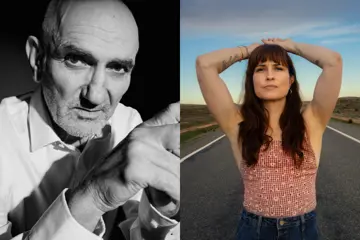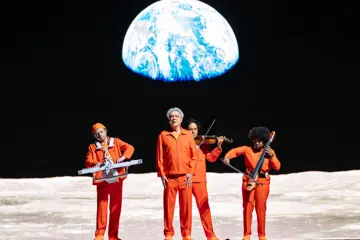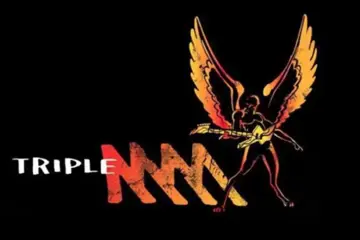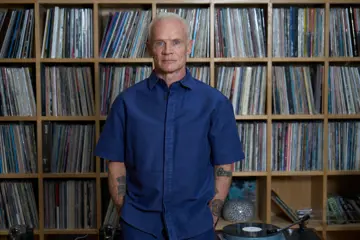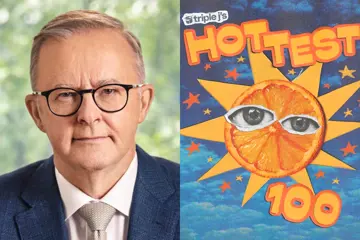JOY

Joy is clearly a biopic by David O. Russell: within 10 minutes, there’s a dysfunctional family, all under one roof, all yelling at each other at once. The kind of broad storytelling and signposted sentimentalism that populates biopics is anathema to Russell, the 57-year-old New Yorker whose comedies have, across his career, gone from black to broad; his Oscar-endorsed Silver Linings Playbook and American Hustle inching towards bona fide screwball.
Joy brings to screen the tale of Joy Mangano (played by DOR muse Jennifer Lawrence), New Jersey housewife turned inventor of the Miracle Mop and endless other household items, and the leading seller in Home Shopping Network history. Essentially, the story is all-too-familiar: Regular Joe/Joy has idea, refuses to listen to the naysayers or be beaten down by the man, becomes fabulously rich and successful.
Russell takes to that story, as screenwriter, and reduces its linearity; new experiences met with old memories, the film flashing forward, delivering revisionist history, and being told via beyond-the-grave narration, from Diane Ladd, that happily kicks down the fourth wall. “Time moves forward, time moves backward, time stands still,” she pronounces; cinema, as ever, a way to play with time, to shatter our normal temporal experience.
For all the nimble moves, nifty associations, and artful pirouettes of the screenwriting structure — which includes a soap-opera that inveigles its way into the days, hearts, minds, and dreams of the characters — Joy doesn’t have the same complexity in theme or emotion. It’s essentially a succession of scenes in which a driven woman stands up to a procession of naysayers. Businessmen dismiss her as a bored housewife. Her father, Robert De Niro, and his widower-girlfriend-turned-investor, Isabella Rossellini, seek to pull the plug at the first sign of trouble, swift to tell her — out loud — that she’s failed. And Elisabeth Röhm’s half-sister — a created character — seeks to get her own back; sibling rivalry turning dastardly double-crossin’ by the end of the second act.
Don't miss a beat with our FREE daily newsletter
Eventually, of course, our heroine triumphs; kicking down the doors of class, shattering glass ceilings, and making it big as a single mom in America. It closes with Lawrence swaggering down a Texan street, part Saturday Night Fever strut, part deal-with-it sunglasses meme. But Russell turns what could be a singular moment into many moments; its narration, within that one moment, taking the film forward, back, and then way forward again, detailing the deep future via its omniscient narration, before throttling back to where we left off, mid-strut. This screenwriting approach serves Joy well through much of its run-time, but makes its ending feel diffused; Russell’s attempts at rewriting a lamentable, Oscarbait-ish genre — and an individual’s history — proving, in the long run, only semi-successful.
YOUTH

Paolo Sorrentino’s films often feel like a collection of music videos; the Italian director less interested in conversation or action that choreography, authoring elaborate montage sequences that foreground his soundtrack selections. Youth, his seventh film and second English-language feature, takes this idea to its logical culmination: at one point, it literally just becomes a Paloma Faith video. Faith appear as herself, as does Mark Kozelek, who mumbles mournfully in several standalone musical sequences (and wrote Birds Of Films about his experience making the film, too). And then there’s Roly Serrano, a lookalike who plays Diego Maradona; allusions to real reality and scripted reality folded into the fictional, fanciful world Sorrentino has created in a Swiss Alpine retreat.
There, Michael Caine and Harvey Keitel play an aging composer and director, respectively; old friends — and old men — holed up together, hiding from the world that reveres them, but has passed them by. Their respective children, Rachel Weisz and Ed Stoppard, are married, but their marriage is falling apart. Paul Dano is a jaded actor who dresses up as Hitler. Keitel is working on a new film, with screenwriting workshops and a casting visit from his old muse Jane Fonda. Caine is resisting overtures to come out of retirement to stage a concert for the Queen. And, well, that’s about it, as far as story goes.
Befitting Sorrentino’s ways, Youth is effectively a series of episodic vignettes and pop-song montage, filled with his familiar predilections: aging flesh, strident caricatures, and cinematic self-reference. When Fonda shows up, Sorrentino tries to mount a state-of-cinema commentary by having her spout screeds about the changing industry, its obsession with comic-books and branded IP. Yet, even as artforms are discussed and displayed, Youth is less interested in theme than spectacle. And that’s fine: you watch a Paolo Sorrentino film for the remarkable visuals. But, ultimately, Youth has the feeling of being but a beautiful balloon: light, colourful, whimsical, and essentially empty.
SUFFRAGETTE

The most profound moment in Sarah Gavron’s Suffragette comes on close, with the final after-the-fact title cards. After spending 100 minutes inhabiting its distant, over-a-century ago history — in which women fighting for the right to vote in England turn to acts of civil disobedience to advance their cause — the film presents the simple facts of the years in which women were granted the right to vote; ending with Saudi Arabia, in which that right came only in 2015.
These simple facts give clarity and concision to the perennial theme underpinning its period-piece: that human rights are constantly being commandeered, that oppression and exploitation remain common, and that women are often the ones bearing that burden. Here, in a screenplay by Abi Morgan (who wrote Gavron’s debut Brick Lane), we meet Carey Mulligan, a washerwoman born-and-raised, slaving her days away in a Dickensian Bethnal Green laundry for a rapey boss. She falls in with the fight for women’s suffrage, losing her job and family in the process; in turn, peaceful protests soon turn towards dissidence, acts of disruption, terror, and strike. It’s a proud portrait of personal sacrifice for social gain, and an unalloyed rallying cry for continued defiance against systems of oppression.
Brendan Gleeson plays a police officer charged with bringing down Mulligan’s suffragette cell (which includes Helena Bonham Carter, Anne-Marie Duff, and Natalie Prass), and, in a deft act of retroactive absurdism, Morgan and Gavron switch the drama to the cops on the beat, and play it, for a few wry moments, as straight policier; these the honest men out to take down a nefarious criminal enterprise. It’s a piece of now-we-know-better humour that doubles as incisive, trenchant theme-stoking; these dissidents of the past deftly connected to the contemporary dissidents still agitating for social change. Suffragette is a film about a specific time and place, but the struggle is eternal.
THE BÉLIER FAMILY

The Bélier Family is an inspirational, follow-your-heart, coming-of-age type movie that was a humungous hit in France. In its crowdpleasery, it feels, dramatically, almost like an episode of a reality-TV singing-show contest. Here, Louane Emera is the teenage girl with the big voice and big dreams, belting out showstoppin’ pop tunes and power-ballads. And, o, does she have a back-story with which to pull at your heartstrings: she comes from a rural French farm where all her family — mother, father, brother — are deaf-mutes. Meaning that, when she wails away, her fam can’t share in her performance, her gift, her dreams. Poignant irony alert!
Éric Lartigau’s film is, in its musical motif, as neat and tidy as a well-penned pop-song. You can feel the formula at work: scenes strong-armed towards broad-comedy or sentimentality, its three acts as structurally-predictable as verse/chorus/bridge. But, like a well-penned pop-song, The Bélier Family looks your cynicism in the eye and meets it with grand emotional sweep. Its one-last-belted-out-power-ballad finalé finds Emera singing — and signing — Michel Sardou’s Last Flight, whose leaving-home lyrics drive home the film’s very themes. If you can get over the feeling of your buttons being pushed, maybe your heart, too, will soar.
THE GOOD DINOSAUR

For all those who’ve dreamt of what would’ve happened had dinosaurs not gone extinct, does Pixar have a film for you. Unfortunately, it has a film for you in which the meteor missed the earth, dinosaurs lived on, developed language, agriculture, and the domestication of animals, and became slack-jawed, buck-toothed rednecks named things like Butch, Buck, Bubbha, Pervis, and Lurleane. I’m just going to assume, in this world, there’s also a Cletus.
There’s a typically-Pixarian approach to story-telling and lesson-teaching, and, I suppose, there’s an interesting inversion of man’s supposed dominion: here the dinosaurs have carved out society in the Western Wilds — it’s Frontier America, just 10 million years ago — but the humans are still rudimentary hominids. The film’s best gags involve its titular hero — a young dinosaur learning to conquer his fears on a cross-country odyssey — ‘adopting’ a caveboy, who essentially functions as a dog. But as they venture together, the dinosaurs they encounter become ever-folksier yokels. And it’s hard to retreat into an animated wonder-world when all the cast sound like they’re auditioning for Horse Apples.
THE PEANUTS MOVIE

Charlie Brown updated for the 21st century? Good grief. For all those who’ve longed to see Charles Schulz’s pithy homilies and line-drawn, put-upon characters in ultra-lurid 3D animation, here comes The Peanuts Movie. I suppose the idea is that it will appeal to nostalgic adults and a new generation of kids alike, and, Schulz’s son and grandson, the writers/producers (working with the studio that’s made the endless Ice Age movies), preserve the laws of the Peanuts universe; this a world of childhood adventure in which adults are unseen and — sad trombone noises aside — unheard. But as its hapless hero battles the same old schoolyard humiliations, the one-note caricatures and lame slapstick comedy grows constricting, and the pushes towards the Meghan Trainor pop-song montage and the feelgood finale feel forced, and at odds with the heavy melancholy the comic-strip was best known for.
PEGGY GUGGENHEIM: ART ADDICT

The life-and-times of Peggy Guggenheim — heiress turned art-collector, a modern-day independent woman pt.2 makin’ her way in a man’s world — are given the generic bio-documentary treatment in Lisa Immordino Vreeland’s mildly-pleasing feature. There’s abundant, oft-inert talking-heads and stock footage, but, gladly, there’s also merry tales of sexual conquests with endless artistic titans, a priceless parade of amazing surrealist and abstract-expressionist art, and a framing theme where Guggenheim’s life effectively mirrors 20th-century history.
TEHRAN TAXI

Jafar Panahi’s first two films made under his state-mandated ban from filmmaking, This Is Not A Film and Closed Curtain, revelled in their covert status, each made as act of cloak-and-dagger subversion, behind closed door. For Tehran Taxi, the Iranian auteur ventures into the world outside, Panahi growing more audacious in his officially-banned-but-still-working status. In homage to Kiarostami’s Ten, the premise finds Panahi as a taxi-driver at work around Tehran, the film shot from dashboard-mounted cameras. It’s a work of docu-fiction that’s a riff on his own career: passengers and their various travails filled with explicit reference to The White Balloon, Crimson Gold, and Offside. As always, the Ministry of Culture looms as an abstract villain; Panahi picking up his real-life niece (Hana Saeidi), and having her read from the sanctioned guidelines for filmmaking under Islamic law.

